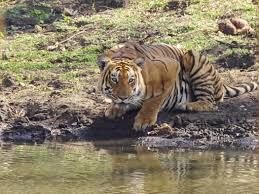UPSC Daily Current Affairs- 17th April 2024 | Current Affairs & Hindu Analysis: Daily, Weekly & Monthly PDF Download
GS-II
Reforms needed in the voting process
Subject: Polity and Governance
Source: The Hindu
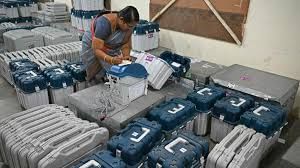
Why in News?
The Supreme Court has decided to hear petitions seeking 100% cross-verification of the Voter Verifiable Paper Audit Trail (VVPAT) slips with the vote count as per Electronic Voting Machines (EVMs).
History of the Voting Process
- First two General Elections:
- In the Elections of 1952 and 1957, a separate box was placed for each candidate with their election symbol. Voters had to drop a blank ballot paper into the box of the candidate whom they wanted to vote for.
- Third Election:
- In the third election, the ballot paper with names of candidates and their symbols was introduced with voters putting a stamp on the candidate of their choice.
- Introduction of EVM in Lok Sabha Elections:
- In the 2004 general elections to the Lok Sabha, EVMs were used in all 543 constituencies.
Global Scenario
- Many Western democracies, including England, France, The Netherlands, and the United States, have opted to continue using paper ballots for their National or Federal Elections instead of Electronic Voting Machines (EVMs).
- Some countries have discontinued the use of EVMs after trials over the past two decades. For example, Germany’s Supreme Court declared the use of EVMs in elections unconstitutional in 2009.
Significance of EVM
- Prevention of Booth Capturing: EVMs have significantly reduced the likelihood of booth capturing, a practice where unauthorized individuals seize control of polling booths to manipulate votes.
- Elimination of Invalid Votes: EVMs have effectively eliminated invalid votes, which were a common issue with paper ballots.
- Environmental Sustainability: With a large electorate size like India’s, which is close to one billion, the use of EVMs contributes to environmental sustainability by reducing the consumption of paper.
- Administrative Convenience: EVMs provide administrative convenience for polling officers on the day of the poll. They simplify the voting process, making it easier for voters to cast their ballots and for officials to manage polling stations efficiently.
Limitations on using EVM
- Susceptibility to Hacking Allegations: Despite assurances from electoral authorities, doubts have been raised about the security of EVMs, with concerns that they may be vulnerable to hacking due to their electronic nature.
- Limited Sample Size for VVPAT Verification: The current practice of verifying the EVM count with Voter Verifiable Paper Audit Trail (VVPAT) slips has a small sample size of only five per assembly constituency/segment.
- Identification of Polling Behavior: The process of matching EVM counts with VVPAT slips at the booth level allows for the identification of polling behavior by various political parties. This information could potentially be used for profiling voters and intimidation, undermining the secrecy and fairness of the electoral process.
Way Forward
- Enhancing Transparency and Comprehensibility: In a transparent democracy, citizens should be able to understand and verify the election process without requiring specialized technical knowledge.
- Scientific Sampling for EVM-VVPAT Matching: Rather than a 100% match, the sample for matching the EVM count with VVPAT slips should be determined scientifically, possibly by dividing each state into large regions as suggested by experts.
- Error Resolution: In case any error is detected, the VVPAT slips for the concerned region should be fully counted, forming the basis for results. This would instill statistically significant confidence in the counting process.
UN Permanent Forum on Indigenous Issues (UNPFII)
Subject: International Relations
Source: The United Nations
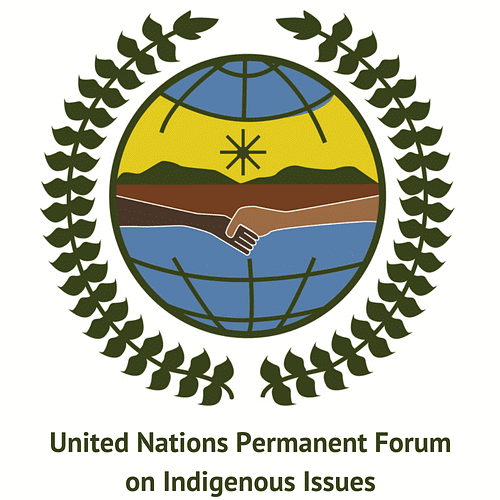
Why in News?
The 23rd session of the UN Permanent Forum on Indigenous Issues started on April 15 in New York.
- The focus is on the urgent need to speed up the recognition and protection of Indigenous Territories (ITs) globally.
About UN Permanent Forum on Indigenous Issues (UNPFII)
- What is it?: One of the three UN bodies mandated to specifically address indigenous peoples' issues.
- Formation: Established on 28 July 2000.
- Headquarters: Located in New York, USA.
- Parent Organization: Operates under the United Nations Economic and Social Council (ECOSOC).
- Membership
- Comprises 16 independent experts serving three-year terms.
- Eight are nominated by member governments.
- Eight are directly nominated by indigenous organizations.
- Comprises 16 independent experts serving three-year terms.
- Countries: Members include Finland, Nepal, Chad, Australia, Colombia, Bolivia, United States, Russia, China, Ecuador, Burundi, Denmark, Mexico, Namibia, Estonia, and one additional rotating seat.
- Mandate
- Provides expert advice and recommendations on indigenous issues to various UN entities through ECOSOC.
- Raises awareness and promotes integration of indigenous issues within the UN system.
- Prepares and disseminates information on indigenous matters.
- Secretariat
- Established by the General Assembly in 2002.
- Based in New York within the Division for Inclusive Social Development (DISD) of the UN Department of Economic and Social Affairs (DESA).
EC Rules on Search of Choppers
Subject: Polity and Governance
Source: Times of India
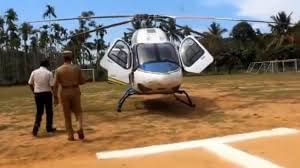
Why in News?
Recently, some Opposition leaders’ helicopters have been in the news as they have been searched by authorities in the last few days. Helicopters are often used by politicians to hop from one place to another during their poll campaigning.
- The Opposition has alleged that these searches were conducted at the behest of the Centre to harass them.
- However, officials in the Election Commission (EC) say they have been carried out in accordance with the poll panel’s standard instructions. It was aimed at preventing the transport of cash and freebies via airfields and helipads since the Model Code of Conduct (MCC) has been in force.
Model Code of Conduct (MCC)
- About
- The MCC is a set of guidelines by the Election Commission of India that spells out how political parties and candidates must conduct themselves during the election campaign and polling.
- It is a set of norms which has evolved with the consensus of political parties.
- Though the MCC has no statutory backing, it has grown in strength as a result of the ECI’s strict enforcement since its implementation in the 1990s.
- It aims to ensure free and fair elections by promoting a level playing field and preventing unfair practices.
- The MCC includes rules regarding campaigning, speeches, polling booths, and general behavior to maintain the integrity of the electoral process.
- Applicability
- The code comes into force immediately when the election dates are declared and remains till the results are announced.
- The MCC applies to all elections from the Lok Sabha and state Assemblies to local bodies.
EC Guidelines
- For commercial helipads and airports
- Chartered aircraft and helicopters don't need permission before landing or taking off from commercial airports according to the EC.
- The Air Traffic Control (ATC) must inform the state's chief electoral officer (CEO) and district electoral officer (DEO) about these flights as soon as possible.
- The ATC must keep a record of all chartered flights, noting the take-off/landing time, passenger list, and flight route.
- Baggage on these flights must be screened by CISF or police personnel without any exceptions.
- For non-commercial helipads and airports
- The flying squads appointed by the EC or the police, along with the pilot, are responsible for inspecting or physically examining all luggage on the aircraft, except for women passengers' hand-held purses, at non-commercial helipads and airports.
- Candidates or political parties need to submit an application to the District Election Officer (DEO) at least 24 hours before the aircraft/helicopter's scheduled arrival for proper security measures.
- If any candidate or party members are found with more than Rs 50,000 in cash on a flight, it may be investigated and confiscated.
- Passengers will not be searched upon disembarking at remote airports/helipads unless there's specific information about unauthorized items like weapons or illegal goods.
Leaders' Aircraft Searches in Past Polls
- Ahead of the 2019 Lok Sabha elections, Mohammed Mohsin, a Karnataka-cadre IAS officer, in the capacity of an election observer, had ordered the search of PM Modi’s helicopter in Odisha.
- The EC subsequently suspended Mohsin and argued that as the PM’s security was handled by the Special Protection Group (SPG), he was exempted from such checks.
- The Central Administrative Tribunal (CAT) stayed his suspension, noting that SPG protectees are not eligible for unrestricted privileges.
GS-III
Mudumalai Tiger Reserve
Subject: Environment
Source: The New Indian Express
Why in News?
A pack of wild dogs or Dholes, in Mudumalai Tiger Reserve (MTR) have suffered severe exfoliating mixed skin infections.
About Mudumalai Tiger Reserve:
- Location:
- It is located in the Nilgiris District of Tamil Nadu, at the tri-junction of three states, viz, Karnataka, Kerala, and Tamil Nadu.
- It lies on the Northeastern and Northwestern slopes of the Nilgiri hills, which is a part of the Western Ghats. It is part of the Nilgiris Biosphere Reserve, the first biosphere reserve in India.
- It has a common boundary with Wayanad Wildlife Sanctuary(Kerala) on the west, Bandipur Tiger Reserve (Karnataka) on the north, the Nilgiris North Division on the south and east, and Gudalur Forest Division on the south-west.
- Habitat: A variety of habitats ranging from tropical evergreen forest, moist deciduous forest, moist teak forest, dry teak forest, secondary grasslands, and swamps are found here.
- River: The Moyar River runs through the reserve.
- Flora:
- It has tall grasses, commonly referred to as “Elephant Grass”, bamboo of the giant variety, and valuable timber species like Teak, Rosewood, etc.
- It has wild relatives of cultivated plants, viz. wild rice, ginger, turmeric, cinnamon, etc.
- The habitat also has swampy areas (Vayals) and grasslands.
- Fauna:
- The faunal assemblage includes: elephant, gaur, sambar, Four Horned antelope, spotted deer, barking deer, blackbuck, wild pig, mouse deer, and predators like tigers, leopards, and wild dogs.
- The recent Oscar-winning ‘Elephant Whisperers’ was filmed at the Theppakadu Elephant Camp, located inside the Mudumalai Tiger Reserve.
GS-III
29 Maoists killed in Bastar encounter
Subject: Defense and Security
Source: News 18
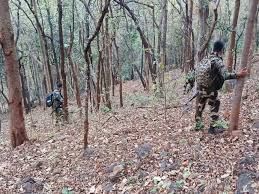
Why in News?
At least 29 Maoists were killed and three security personnel were injured in a gunbattle in a forest in Kanker district of Bastar division in Chhattisgarh. This marked the highest number of Maoist casualties in a single operation in the Bastar region. The operation was conducted by a joint team of DRG (District Reserve Guards) and BSF (Border Security Force).
Left Wing Extremism (LWE)
Left-wing extremism is a significant internal security threat affecting multiple states in India. LWE aims to overthrow the existing democratic state structure using violence as their primary tool, along with mass mobilization and strategic united fronts. The goal is to bring about a 'New Democratic Revolution' in India. These extremists are commonly referred to as Maoists globally and as Naxalites in India.
Current Situation of LWE in India
Recent reports indicate a decrease in Maoist violence in the country. The Ministry of Home Affairs highlights that Maoist violence has decreased by 77% since 2010, with a significant drop in resultant deaths. The government has also reduced the number of Naxal-affected districts from over 200 to just 90, claiming that violence is concentrated in about 45 districts. States like Andhra Pradesh, Telangana, Odisha, Jharkhand, and Bihar, which were once strongholds, now have minimal to zero Naxal presence.
Maoism and Naxalism
Maoism and Naxalism are synonymous, with Naxalism following Maoist ideology. The core tenet of Maoist ideology is the use of violence and armed insurrection to seize State power. The Communist Party of India (Maoist) is the largest and most violent Maoist group in India, formed through the merger of various Maoist factions. The group and its affiliates are designated as banned terrorist organizations.
Recent Bastar Encounter
In the recent Bastar encounter, 29 Maoists were killed in a confrontation with security forces. The operation was conducted jointly by DRG and BSF. DRG, a specialized police unit in states like Chhattisgarh, is trained to combat Naxalite and Maoist insurgencies. Comprising local tribal personnel familiar with the terrain, they receive training in guerrilla and jungle warfare, as well as modern weaponry.
Growth in Ashwagandha Exports
Subject: Economics
Source: The Hindu Business Line

Why in News?
Ashwagandha exports have surged by 8 times in the past six years, penetrating markets like the United States, Czech Republic, and Canada.
What is Ashwagandha?
- Ashwagandha, also known as Indian Ginseng or Withania somnifera, belongs to a category of herbs referred to as 'adaptogens', known for their rejuvenating properties.
- It is available in various forms such as extracts, powder, and raw herbs, catering to both domestic and international markets.
Medicinal Properties and Usage:
- In the treatment of rheumatic pain, joint inflammation, nervous disorders, and epilepsy.
- Used as a remedy for ailments like hiccup, cold, cough, female disorders, sedative purposes, care of senile debility, ulcers, etc.
- Applied externally for carbuncles, inflammation, swellings, and conjunctivitis.
- Decoction from the bark is consumed for asthma and applied topically to bed sores.
- Ashwagandha and its extracts are utilized in the production of herbal teas, powders, tablets, and syrups.
Cultivation of Ashwagandha
- Ashwagandha is cultivated in states like Rajasthan, Punjab, Haryana, Uttar Pradesh, Gujarat, Maharashtra, and Madhya Pradesh.
- As a hardy and drought-tolerant crop, Ashwagandha thrives in relatively dry conditions throughout its growth cycle.
- It is typically grown as a late rainy season (kharif) crop at altitudes ranging between 600-1200 meters.
- Ideal soil conditions for its cultivation include sandy loam or light red soil with a pH level of 7.5 to 8.0 and good drainage. Heavy soils like black soil are also suitable for cultivation.
India could face 'Imported Inflation': Asian Development Bank (ADB)
Subject: Economics
Source: The Hindu
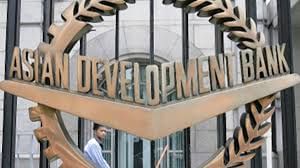
Why in News?
The Asian Development Bank has issued a warning regarding India's vulnerability to imported inflation due to a potential depreciation of the rupee alongside rising interest rates in the Western countries.
What is Imported Inflation?
- Imported inflation signifies the price hike of goods and services within a nation triggered by an increase in the cost or price of imports.
- This situation arises when factors like a devaluing currency, escalated import expenditures, or heightened international prices result in increased costs for imported goods and services.
- Consequently, manufacturers might raise their prices to counterbalance these augmented costs, thereby generating inflationary forces within the local economy.
- This concept is related to the theory of cost-push inflation, which implies that when input expenses surge, it can also lead to a rise in prices of final products.
Reason behind the imported inflation:
- Capital Flows: Increased interest rates in Western nations lure foreign investors in pursuit of higher returns, resulting in capital outflows from countries like India and potentially causing the depreciation of the Indian rupee. When a currency depreciates, domestic consumers require more of their local currency to purchase foreign goods, thereby increasing import prices.
- Borrowing Costs: Indian businesses and the government might encounter elevated borrowing expenses for infrastructure ventures and investments if they raise funds in foreign currency-dominated global markets.
- Inflationary Pressures: Capital outflows can strain the Indian rupee, leading to imported inflation as the prices of imported goods surge due to currency devaluation.
- Trade Competitiveness: Fluctuations in exchange rates following Western interest rate variations impact India's trade competitiveness, influencing exports, imports, and domestic consumption.
Why has India Allowed FIIs to Invest in Green Bonds?
Subject: Economics
Source: The Hindu

Why in News?
On April 5 the Reserve Bank of India (RBI) green lighted investments in the country’s Sovereign Green Bonds (SGrBs) by Foreign Institutional Investors (FIIS).
Foreign Institutional Investors (FIIs)
- FIIs are entities from foreign countries investing in a nation's financial markets.
- They include pension funds, mutual funds, banks, and other financial institutions.
- FIIs impact local economies by boosting liquidity, trading volumes, and stock prices.
- Regulated by SEBI in India, with investment ceilings managed by RBI.
Green Bonds
- Issued for eco-friendly projects, offering fixed income to investors.
- Fund projects like renewable energy, clean transportation, and green buildings.
- Example: World Bank issued $14.4 billion in green bonds for various projects worldwide.
India's Sovereign Green Bonds Framework
- Launched to raise funds for green infrastructure, aiming for Rs 16,000 crore by March 2023.
- Features include issuance through Uniform Price Auction, eligibility for Repo, and trading in secondary market.
- Non-residents can invest through the 'Fully Accessible Route'.
- Eligible projects cover green expenditures and exclude certain sectors like nuclear power and alcohol industries.
FIIs Investing in Green Bonds
- RBI permitted FIIs to invest in India's Sovereign Green Bonds.
- SGrBs worth Rs 16,000 crore issued, oversubscribed mainly by domestic institutions.
- SGrBs offer lower interest than traditional G-Secs, promoting a greener future.
Significance of RBI's Decision
- Enables more capital for India's green projects to achieve set goals like 2070 net zero targets.
- Aims to increase non-fossil fuel energy sources to 50% and cut carbon intensity by 45%.
|
63 videos|5408 docs|1146 tests
|
FAQs on UPSC Daily Current Affairs- 17th April 2024 - Current Affairs & Hindu Analysis: Daily, Weekly & Monthly
| 1. What are some of the key reforms needed in the voting process mentioned in the article? |  |
| 2. What is the role of the UN Permanent Forum on Indigenous Issues (UNPFII) as discussed in the article? |  |
| 3. What are some of the EC Rules on Search of Choppers mentioned in the article? |  |
| 4. What is the significance of Mudumalai Tiger Reserve discussed in the article? |  |
| 5. Why is India facing the possibility of 'Imported Inflation' according to the Asian Development Bank (ADB) as mentioned in the article? |  |


